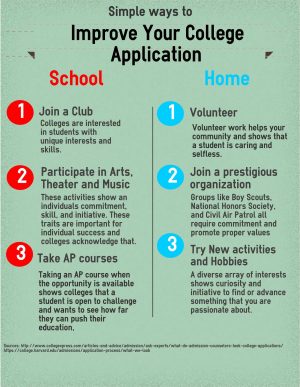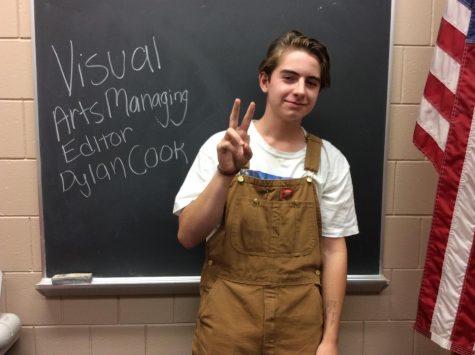The ins and outs of college application
November 18, 2015

Nearly every student at Stillwater Area High School will face the task of applying for college. Knowing what looks best on an application can make the process of applying less stressful and help to ensure acceptance to desired schools.
Any student who desires a college education must submit their application to schools that they are interested in attending. Colleges use the information on the applications to decide if the student is right for the school. This makes having a strong application crucial for acceptance into desirable colleges. With deadlines constantly on the horizon, a GPA to maintain and standardized tests to study for, students can have difficulty maintaining a proper focus on their application. The bombardment of tasks can pile up and put applications at a low priority level. Submission deadlines come fast and many find themselves feeling that their application is unprepared or just not strong enough to compete. The best way to combat this issue is to know what colleges want to see ahead of time.
Every single day of a high school student’s career impacts their grade point average. GPA summarizes performance across all 4 years in a general fashion. It is a baseline for a student’s performance and allows teachers, students, parents and colleges to quickly know a student’s average academic performance.
“The very first thing that colleges typically look at is the high school transcript,”, counselor Kate Nelson said. “They look at your record and they see since ninth grade forward how much you have challenged yourself in your academics.”
Not all schools are created equal and some look for much different qualities in students. With many liberal arts schools being more focused on a student’s creativity than their academics, it is valuable to know what one plans to go to college for. Knowing the expectations of a desired school helps to keep preparation focused and thorough. This does not mean one should diminish effort and lower scores, it simply means that different schools have varying expectations which can influence the content of an application.
“We do not look at volunteer hours, lettering, or awards (that do not involve the arts) for students when they apply to MCAD,” Minneapolis College of Art and Design admissions officer Jessica Scott said. “They do not sway on the student’s application at all.”
A good GPA is reliable but in order to stand out one should strive to further their education by taking AP courses. These courses require more time and effort and often use complex concepts and applications. Many are worth college credit and have a difficult final exam. The amount of AP courses a student has passed tells colleges about their willingness and ability to endure high rigor coursework and testing, much like what is seen at colleges.
“They want to know if you have exhausted the rigor that you are capable of handling,” Nelson said. “For example, if your school offers AP [they want to see] that you’re taking as many AP courses with rigor that you can manage.”
Previous education also matters to colleges. Understanding a student’s past experience and background provides context and helps colleges know if a student is right for their school or not.
“
,” Nelson said.Admission is not exclusively about academic skill. Clubs and volunteer work are both simple methods of standing out without changing educational path and course rigor. There is a constant need for volunteer work and an abundance of clubs to join, making each a realistic and simple way to improve an application.
“Anything with leadership. They want to make sure that they are admitting students that are mature and have leadership skills,” Nelson said. “They want to understand that you really are genuinely interested and involved in whatever the club is about.”
Involvement in sports teams and groups like the Boy Scouts and Civil Air Patrol also show commitment and go well with clubs and volunteer work. Despite the large chunks of time consumed by these activities, students can benefit tremendously because of their prestigious nature and the required time it takes outside of school to participate.
“I’m in Boy Scouts and CAP, but haven’t received the highest rank in either, but at least the volunteer work is there,” senior Forbes Gefre said. “I played football from 8th to 12th grade. It seemed to work since I got accepted into the U of M College of Science and Engineering.”
“They want to make sure that you are a good fit for what their institution is all about,” Nelson said.








Kai Knudson • Jan 6, 2016 at 4:32 pm
College preparation is a taunting, terrifying task in my future. This article did a good job to help prepare people for this. So many news articles are about catastrophic events that we really can’t do anything about, so it’s nice to have an article that really is actually relevant and helpful. <3